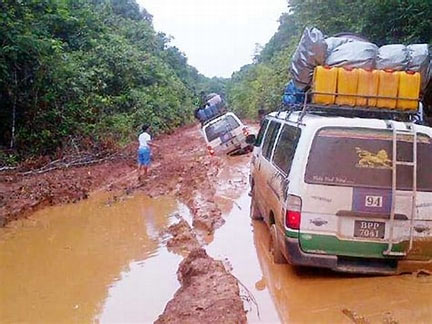x In this issue of the Stabroek Business we complete the feature article ‘Rupununi Rising?’ an exchange with Rupununi Chamber of Commerce President Orlando Wong on some of the prospects and challenges associated with the development of the Rupununi.
Not least among Wong’s concerns is a fear that the Rupununi will continue to have to endure the customary frustration of being subjected to ‘fair promises’ from central government that bear little, if any, fruit. To him, the endless challenges associated with the complete and comforting construction of a road between Linden and Lethem is the ‘acid test’ of the sincerity of the undertakings that have been afforded by central government, over the years. Trust, these days appears to be a critical issue.
Concern over the length of time that it is taking for the Linden to Lethem road to become a pleasing reality is, the Lethem official feels, an ominous warning. What had previously been hyped as a forward-looking development is now being touted as a 450- -kilometre stretch of ‘trail’ which becomes a source of unending frustration during periods of bad weather. Hours, sometimes days of waiting for vehicles to be rid of the mud that clings unyieldingly to their wheels not only ‘holds up’ business, among other pursuits, but engenders a lack of confidence in official undertakings to fully develop the Rupununi. It is the Rupununi Chamber, Wong says, that has to bear much of the brunt of the frustration vented by road users, some of whom – according to Wong, now appear to be persuaded that as far as a road linking the coast with the Rupununi is concerned, we are, at this juncture, on a hiding to nowhere.
Setting aside the slow pace at which the road is proceeding and the uncertainties associated with a timeline for its full and final completion there are other frustrations too… like what the vehicle owners say is the Pirara Bridge which, they contend, has become unbearably compromised on account of what is widely believe to be ‘shoddy’ work that has left some of the pillars busted and the exposed steel exposed to rusting. Seemingly nowhere near effective completion, it remains one of the main challenges to reliable overland travel between the capital and Lethem. When the rainy season kicks in there is simply no reliable way of reaching Lethem by road.
Wong says that ‘fed up’ with the consequences of the shoddy work to which appurtenances to the development and comfort of the Rupununi continues to be subjected, the Chamber engaged central government on the question of the body serving as monitors during the construction of projects associated with the region. It has, so far, not been charged with that responsibility. The Stabroek Business has learnt of recent terse engagements between Works Minister, Juan Edghill, and the Brazilian construction company, Queiroz S, that is executing projects in Guyana. The Minister is reported to have met with representatives a few weeks ago on the subject of the company’s reported tardiness on the execution of assignments. The Rupununi official also expressed concern to the Stabroek Business over the paucity of services and facilities in Lethem to support the need for worthwhile pursuits for young people outside the school setting.
While, he says, the children of Lethem are receiving ‘reasonable education’ during their nursery, primary and secondary life, there is a need for more extracurricular activities, such as clubs and some sporting activities. School dismisses at 2 pm, therefore there is sufficient time for children to be involved in extracurricular activities. Further, given what the Lethem official said is a prevailing “excellent cross border relationship” there is room for an initiative through which Guyanese children can access lessons in Portuguese from Brazilian teachers.
Wong is also advocating for the development of playgrounds within the school areas. Moreover, with secondary schools now planned for Aishalton, Karasabai among others, it is expected the greater numbers of children residing in the Rupununi would have access to the CXC examination. This is not to say, Wong told the Stabroek Business, that the ‘attraction’ of gold-mining will cease. Gold, he explains, can be compelling in its lure. Rupununi residents are also subject to the ‘pull’ of job opportunities in Brazil, Wong says. If there was no sign of lost hope in what the Rupununi official had to say to the Stabroek Business, there is a sense of urgency in his submissions that sends an unmistakable signal that the Rupununi is chomping at the bit and that the community’s patience, insofar as its growth and development are concerned, is by no means inexhaustible.






